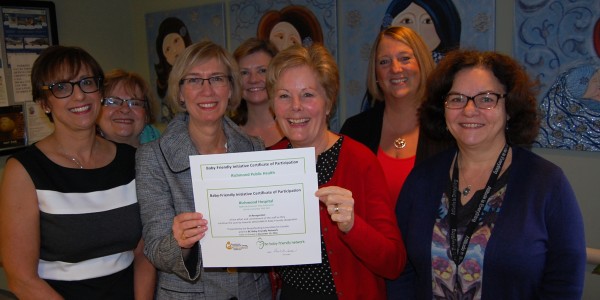On the path to Baby Friendly in Richmond
Richmond is one step closer to becoming an officially designated Baby-Friendly Community of Care.
In mid-December, Richmond Hospital and Richmond Community & Family Health received Certificates of Participation to acknowledge first-phase completion of the program requirements leading to Baby-Friendly (BF) designation.
This designation recognizes hospitals and community health services that offer an optimal level of care for mothers and infants. In practical terms, a Baby-Friendly facility encourages and helps women to successfully initiate and continue to breastfeed their babies, and will receive special recognition for having done so. Since the inception of the program, more than 15,000 hospitals world-wide have received the Baby–Friendly designation.
“Richmond is our first CoC to move forward as part of the regional work towards Baby-Friendly designation,” said Patty Keith, the recently retired regional director, Maternity & Child Services, VCH. “This is an exciting milestone.”
Becoming Baby Friendly takes time
Much work by the maternal care and public health teams in Richmond has gone into achieving the Certificates of Participation, issued by the Breastfeeding Committee for Canada and the BC Baby Friendly Network.
“Achieving Baby-Friendly designation is a long, but worthwhile process,” said Diane Bissenden, director, Population & Family Health. “Our team is confident that we will officially become a designated Baby-Friendly CoC in the not-too-distant future.”
Richmond’s next piece of work toward achieving formal designation is to establish a multidisciplinary breastfeeding committee.
VCH has a regional Baby Friendly Initiative Steering Committee that supports the initiative across the region. All hospitals, planned maternity care and public health centres in our region have received Certificates of Intention which indicate they are on the path toward Baby Friendly.
Putting a plan in place
The committee’s work will include a review of breastfeeding rates and care practices, as well as work toward developing a plan to implement the Baby-Friendly Initiative’s Integrated 10 Steps Practice Outcome Indicators.
These 10 steps include development of a written breastfeeding policy, ensuring that staff has the skills necessary to implement the policy, helping all mothers initiate breastfeeding within 30 minutes of birth, and round-the-clock rooming-in.
As part of the ongoing work towards Baby-Friendly status, Richmond Public Health is also setting up a donor breast milk depot at its office at 8100 Granville Avenue. Richmond mothers with extra breast milk will be able to drop off the excess to Richmond Public Health where it will be frozen and transported to BC Women’s and Children’s Hospital for pasteurization.
“This will help to increase the available donor breast milk supply for babies in our Neonatal Intensive Care Units across VCH,” Bissenden said.
What constitutes Baby Friendly?
In order to achieve Baby-Friendly designation, every hospital and maternity facility must:
- Have a written breastfeeding policy that is routinely communicated to all health care staff.
- Train all health care staff in skills necessary to implement this policy.
- Inform all pregnant women about the benefits and management of breastfeeding.
- Help mothers to initiate breastfeeding within a half-hour of birth.
- Show mothers how to breastfeed and how to maintain lactation even if they should be separated from their infants.
- Give newborn infants no food or drink other than breast milk, unless medically indicated.
- Practice rooming-in, allow mothers and infants to remain together – 24 hours a day.
- Encourage breastfeeding on demand.
- Give no artificial teats or pacifiers (also called dummies or soothers) to breastfeeding infants.
- Foster the establishment of breastfeeding support groups and refer mothers to them on discharge from the hospital or clinic.

